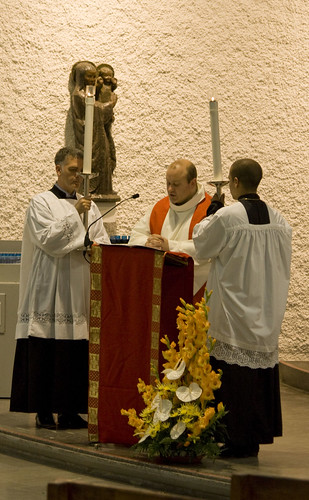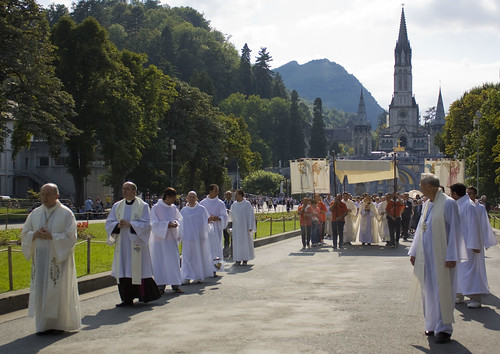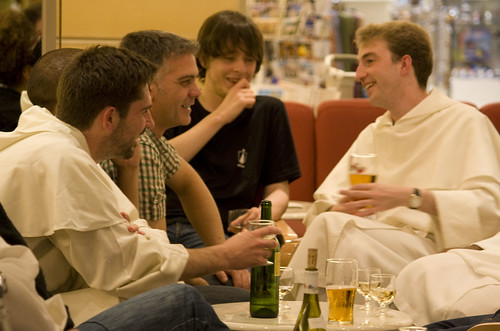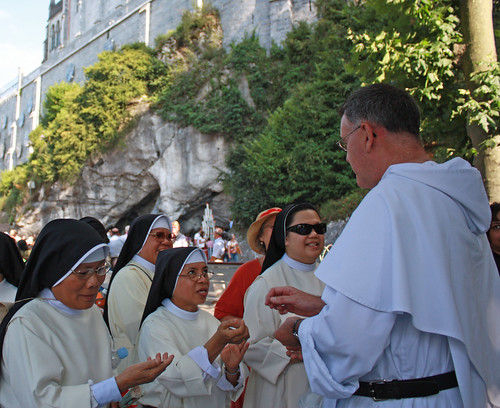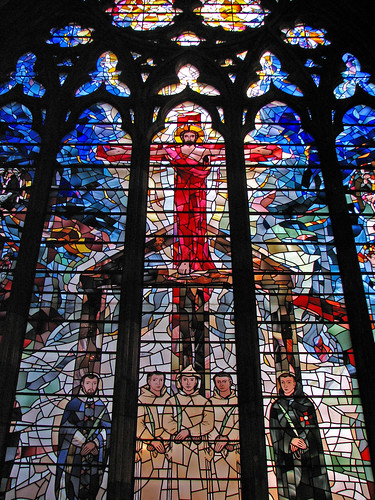Readings: Revelation 11:19a; 12:1-6a, 10ab; 1 Corinthians 15:20-27; Luke 1:39-56
In the summer of 1270 our brother Thomas Aquinas took advantage of the long vacation to attend to a few jobs that had come in during the academic year. One was a request from a friend of his, James of Tonengo, a canon at the cathedral of Vercelli. James’s problem was that the canons of the cathedral could not agree about who the next bishop should be. They were deadlocked. Not only that, they could not appeal to the Pope because there was no Pope! Clement IV died in November 1268 and his successor, Gregory X, was not elected until September 1271, an inter-regnum of almost three years, the longest in the history of the papacy. The cardinals, meeting at Viterbo, were also deadlocked. This was so unsettling for everybody that the civil authorities eventually locked them in, took the roof off the place in which they were meeting (to expose them to the sun and the rain), and finally starved them until they came to a decision. (It was in fact Gregory X who established the conclave more or less as we know it in order to prevent such a thing happening again.)
James’s question to Thomas was this: given the circumstances, would it be acceptable for the canons of Vercelli to choose a new bishop by casting lots, i.e. by tossing a coin, using cards, or in some other way. They could not agree and there was no Pope to whom they could appeal. Would it not in fact leave more room for the Holy Spirit to show his hand if they were to cast lots? Thomas wrote a short work in reply, called
De sortibus (‘On casting lots’), in which he says that it would not only be unacceptable to choose spiritual leaders in this way, it would be an insult to the Holy Spirit. Why an insult to the Holy Spirit? Because, Thomas says, the Spirit has been poured into the Church and if something is to happen now by divine inspiration it must happen through human thinking and decision-making. Thomas notes that Matthias was chosen to replace Judas by casting lots but this was before the day of Pentecost when the Spirit was given to the Church. Now – it bears repeating – if something is to happen among us by divine inspiration it must happen through what Thomas calls
concordia, the consensus reached through human beings talking, thinking and voting.

Why talk about such a thing on the feast of the Assumption of Mary? It is because Mary teaches us so much about grace and the way it works in the human being. The Spirit is given to us and the gift of grace is established within us not in order to replace human conversation and thinking and decision-making but in order to enable them to happen and to happen better. The first creation requires only God’s word – ‘let there be light’, and so it was. The new creation requires also the word of the human creature – ‘let what you have said be done to me’. Mary’s
fiat is her vote, her voice sounding. Creation waits expectantly for her response to the proposal put to her by Gabriel. The gift of the Spirit does not replace our humanity but enables it, heals it and strengthens it, allowing our thinking and our speaking and our action to reach beyond what would be possible for them without God’s grace. God’s will works in and through Mary’s will just as, and even more so, it works in and through the human will of Jesus. ‘Father, let this cup pass me by’, he prays in Gethsemane, ‘yet not what I will but what you will’ (Mark 14:36).
Paul speaks thus in the second reading: ‘the resurrection of the dead has come through a human being’. Later in the same chapter he writes ‘thanks be to God who gives us the victory through our Lord Jesus Christ’ (1 Cor 15:57). It is God’s victory, given to us. It is the work of God because it is a new creation, but God does not work it without us. Elsewhere Paul speaks of the ‘Spirit bearing witness with our spirit that we are children of God’ (Rom 8: 16) – the divine Spirit and the created spirit collaborate, work together, in this new life, the life of the new creation. It is not that the Holy Spirit says to us ‘push over and let me do it’ but that the Spirit says ‘let me enable you to do it, let me establish and strengthen in you the gifts of wisdom, courage and love that will make it possible for you to do it’.
Mary’s immediate instinct on the departure of the angel is to go and visit Elisabeth. Immediately she sets out. This teaches us something further about grace, that it always carries with it a call and a mission. To receive a gift from God does not mean simply to be loved but to become a lover. Thomas Aquinas speaks beautifully about this elsewhere in his writings. The only thing God can give is God and God is love. So the gift of God is always the gift of love. But truly to receive it means not just that I am loved but that I am made to be a lover. So Mary, conceiving the Word, immediately sets out to the one who is in need, and carries the Word to her.
Mary and Elisabeth are then preachers of the gospel to each other. It is striking that the language Luke uses in his account of the visitation anticipates the language he will use in the Acts of the Apostles to speak about the preaching of the gospel: there are words spoken and heard (‘Elisabeth shouted with a great shout’, ‘when the sound of your greeting reached my ear’), there is the response within when the news of the Word is received (‘the babe leaped in her womb’), there is the Spirit enabling the reception of the Word (‘Elisabeth was filled with the Holy Spirit’), there is faith (‘blessed is she who believed’) and joy (‘the babe leaped with joy’). This is how it is when the gospel is preached and heard.
I remember well a comment of Albert Nolan’s when he spoke in Dublin many years ago. The Cabra sisters invited him, as I remember, and the friars were invited to attend also. He spoke of the heart, lips and hands, saying that Christian compassion must reach from the heart to the lips and on to action. It is not enough just to feel for others who suffer but to speak up for them and to do something about their situation. It is not enough just to do something but that action be supported by truthful speaking and loving compassion. So with Mary, she is disposed in her heart to receive the word of the angel and so conceives the Word Incarnate. She is enabled by the Spirit to speak what has happened (‘my soul magnifies the Lord’). And she takes action, going immediately to help the one who is in need and to bring the message of the gospel to her.
As we celebrate this great feast of Mary’s participation in the new creation won by her Son, and as we recall the wisdom of our brother Thomas Aquinas, we pray that we will come to understand better the gifts we have received, to be gracious and compassionate companions, speaking what is true and doing what is good.
For another homily for the Feast of the Assumption, by fr Thomas Skeats, a Godzdogz contributor, see
here.
 Fr Richard Finn published Asceticism in the Graeco-Roman World (Cambridge University Press). Asceticism deploys abstention, self-control, and self-denial, to order oneself or a community in relation to the divine. Both its practices and the cultural ideals they expressed were important to pagans, Jews, Christians of different kinds, and Manichees. Fr Richard presents for the first time a combined study of the major ascetic traditions, which have been previously misunderstood by being studied separately. He examines how people abstained from food, drink, sexual relations, sleep, and wealth; what they meant by their behaviour; and how they influenced others in the Graeco-Roman world. Against this background, the book charts the rise of monasticism in Egypt, Asia Minor, Syria, and North Africa, assessing the crucial role played by the third-century exegete, Origen, and asks why monasticism developed so variously in different regions.
Fr Richard Finn published Asceticism in the Graeco-Roman World (Cambridge University Press). Asceticism deploys abstention, self-control, and self-denial, to order oneself or a community in relation to the divine. Both its practices and the cultural ideals they expressed were important to pagans, Jews, Christians of different kinds, and Manichees. Fr Richard presents for the first time a combined study of the major ascetic traditions, which have been previously misunderstood by being studied separately. He examines how people abstained from food, drink, sexual relations, sleep, and wealth; what they meant by their behaviour; and how they influenced others in the Graeco-Roman world. Against this background, the book charts the rise of monasticism in Egypt, Asia Minor, Syria, and North Africa, assessing the crucial role played by the third-century exegete, Origen, and asks why monasticism developed so variously in different regions. Fr Denis Minns, prior of Oxford from 2000 to 2006, together with Paul Parvis, published Justin, Philosopher and Martyr: Apologies (Oxford University Press). Justin Martyr (c.100-165) was one of the key apologists of the Early Church and this is a new critical edition of the Greek text of the Apologies with introduction, English translation, and textual commentary. Fr Denis and Dr Parvis take a searching look at the text transmitted by the single fourteenth-century manuscript containing the works of Justin. They attempt to see behind the work of the Byzantine editor, and of his predecessors, who sought to make sense of the badly damaged text. The commentary is designed not merely to annotate the text but to identify and draw out Justin's train of thought and the structure of his argument. Justin is located within his Christian, Hellenistic, and philosophical contexts. A new understanding of Justin emerges from this work, and the difficulty of the task he set himself of bridging the enormous gap between two cultures is clearly shown.
Fr Denis Minns, prior of Oxford from 2000 to 2006, together with Paul Parvis, published Justin, Philosopher and Martyr: Apologies (Oxford University Press). Justin Martyr (c.100-165) was one of the key apologists of the Early Church and this is a new critical edition of the Greek text of the Apologies with introduction, English translation, and textual commentary. Fr Denis and Dr Parvis take a searching look at the text transmitted by the single fourteenth-century manuscript containing the works of Justin. They attempt to see behind the work of the Byzantine editor, and of his predecessors, who sought to make sense of the badly damaged text. The commentary is designed not merely to annotate the text but to identify and draw out Justin's train of thought and the structure of his argument. Justin is located within his Christian, Hellenistic, and philosophical contexts. A new understanding of Justin emerges from this work, and the difficulty of the task he set himself of bridging the enormous gap between two cultures is clearly shown. Fr Richard Conrad published 7 Gifts of the Holy Spirit (Catholic Truth Society), which the publishers describe as an introduction to living with the Holy Spirit and the gifts it brings. Every Christian who has been confirmed has received the fullness of the seven Gifts of the Holy Spirit. This booklet explains what these gifts are, the effect they can have on the life of the person who accepts them, and what a life truly led by the Spirit should look like.
Fr Richard Conrad published 7 Gifts of the Holy Spirit (Catholic Truth Society), which the publishers describe as an introduction to living with the Holy Spirit and the gifts it brings. Every Christian who has been confirmed has received the fullness of the seven Gifts of the Holy Spirit. This booklet explains what these gifts are, the effect they can have on the life of the person who accepts them, and what a life truly led by the Spirit should look like. In the same batch of new publications from the Catholic Truth Society is Thomas Aquinas: The Mind in Love by Fr Vivian Boland, which the publishers describe as an introduction to the life, thought and relevance of the 'Angelic Doctor'. Thomas is an unusual saint, having spent most of his life teaching in universities and writing in his convent, yet his thought has defined Catholic theology for almost eight hundred years. Not just a theologian, he was also a philosopher, mystic and poet, and responsible for some of the most beautiful hymns used in the Catholic liturgy.
In the same batch of new publications from the Catholic Truth Society is Thomas Aquinas: The Mind in Love by Fr Vivian Boland, which the publishers describe as an introduction to the life, thought and relevance of the 'Angelic Doctor'. Thomas is an unusual saint, having spent most of his life teaching in universities and writing in his convent, yet his thought has defined Catholic theology for almost eight hundred years. Not just a theologian, he was also a philosopher, mystic and poet, and responsible for some of the most beautiful hymns used in the Catholic liturgy.

